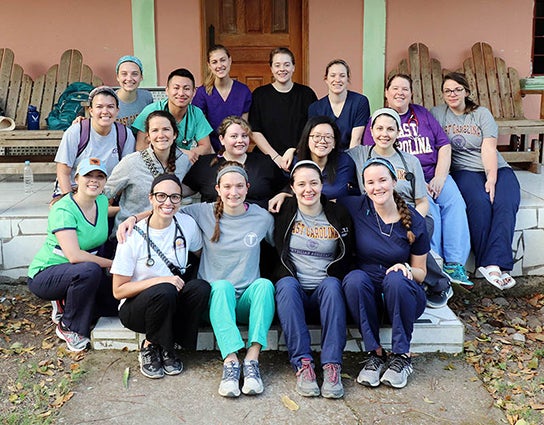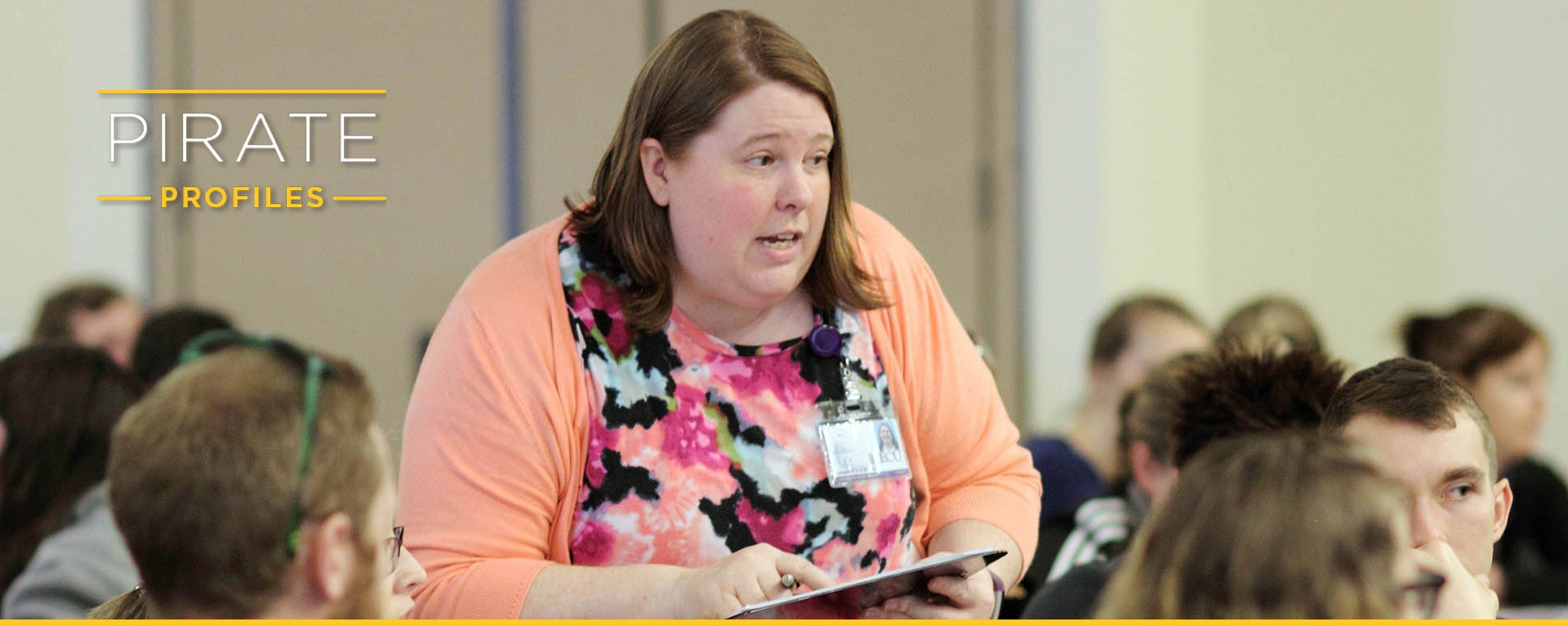Faculty: Kim Stokes
Between her personal health situation as a child and a supportive family that stressed community and education, Kim Stokes seemed destined for a career in health care and of community support.
“I had a spinal birth defect and musculoskeletal deformity that affected my ability to function — notably, to walk — appropriately,” said Stokes, clinical associate professor, director of clinical education and physician assistant in East Carolina University’s College of Allied Health Sciences. “I had surgery twice by the time I was 10 and was in the hospital for at least two weeks on each occasion. It seemed inevitable that I would study medicine on some level ever since then.”
Stokes grew up in Warrensville, a rural mountain town in Ashe County in the northwest corner of North Carolina. She described it as both “difficult and magical.”

Kim Stokes poses for a photo with her students during a trip to Honduras where they learned the importance of serving rural and underserved communities.
“Appalachia remains an area of poverty with people who work extremely hard and take a lot of pride in their families. My family was no different,” Stokes said. “My parents divorced when I was young. My mom was a teacher; my dad a paramedic. Through my relationships with them and my stepparents, I learned important values: family, hard work, perseverance, character, hope and faith to name a few, but also perspective. I knew people who lived in literal shacks, in trailers, in old farmhouses, in brick ranches and really nice houses. But we were all just people trying to make it. And my family taught me to see that perspective along with the value of every person.”
Growing up in that rural setting where some needs go unmet is what drew her to ECU and eastern North Carolina.
“I love that ECU has a focus on access and rural/underserved communities,” Stokes said. “ECU is also, in my opinion, unique. This community has the most down-to-earth and highly knowledgeable base of individuals I have ever seen. It also has the rural touches that I grew up with. The ECU community embraces all.”
In her role as director of clinical education for the Department of Physician Assistant Studies, Stokes oversees the clinical curriculum to ensure students meet the requirements to complete the program, while gaining exposure to rural and underserved populations. She and her team place 432 students in clinical experiences annually, most in eastern North Carolina.
Stokes also serves on the dean’s task force for interprofessional education in the college.
“This work allows me to work closely with faculty from other departments to create interprofessional learning opportunities for our students in the College of Allied Health Sciences,” said Stokes, whose mother, sister and brother-in-law are all educators.
She said the roles of physician assistants (P.A.) are critical, especially in rural and underserved areas where access to health care, especially primary care, is in short supply.
“And the problem is only worsening as the population ages and youth migrate to more urban areas,” she said. “Physician assistants can help meet this primary care need.”
Stokes primarily teaches a course called “Role of the Physician Assistant” in which service learning is stressed. Last year, it included the opportunity for students to travel to Honduras.
“This is my favorite class to teach because I get to encourage students to serve rural, underserved communities,” Stokes said, adding that it provides her a chance to serve as well.
The COVID-19 pandemic has caused Stokes and others in the Department of Physician Assistant Studies to scramble. She said students in rotation completed contingency assignments similar to those used during hurricane season. She said about 25% of students’ clinical year schedules will have to be rescheduled going forward.
“COVID puts everything behind and ensures I will stay very busy for the unforeseeable future,” Stokes said. “I have been very proud of our P.A. faculty who have been able to flip instruction to online modules for learners.”
Outside of ECU, the married mother of two daughters — ages 8 and 10 — sings in her church choir and enjoys visiting her family in the mountains. She also volunteers when she can at a Pitt County Care health clinic.
Stokes, who has been at ECU since 2012, continues to grow professionally. She’s collaborated on various grants, participated in the Chancellor’s Leadership Academy and attended the Harvard Macy Institute for Health Professions Educators conference. Last year, she joined a doctoral degree cohort and presented at the national P.A. Education Association Education Forum.
“I want to encourage people to seek out new opportunities to learn and grow,” Stokes said. “Many health professions educators are trained clinicians, but not trained educators. We need to continue to learn the best methods for teaching and ensuring our students learn the needed skills to be competent providers.”
What advice do you give to students? I advise students to give their all, to know themselves and to be themselves. They can’t grow if they are not given feedback or encouraged. They should seek feedback and use it as a learning opportunity. When they are given encouragement, take the risks. Who knows where it might take them? And even a “failure” is successful in providing feedback you can use for change.
FAST FACTS
Name: Kim Stokes
Title: Clinical Associate Professor, Director of Clinical Education, Physician Assistant, East Carolina University College of Allied Health Sciences, Department of Physician Assistant Studies
Hometown: Warrensville
Colleges attended and degrees: Lenoir-Rhyne University, Bachelor of Science in Biology; East Carolina University, Bachelor of Science in Physician Assistant Studies; Duke University, Master of Health Science; University of Lynchburg, Doctorate of Medical Science with a concentration in Physician Assistant Education
PIRATE PRIDE
Years at ECU: Eight
What I do at ECU: I am currently the director of clinical education for the physician assistant program. I oversee the clinical year curriculum to ensure our students meet requirements for program completion and our program outcomes, including 432 clinical placements annually. I spend most of my day in meetings, providing reports, staring at spreadsheets willing them to comply, staring at blank pieces of paper and scribbling ideas, working with students to ensure they have what they need, and of course recruiting sites. I also work with the College of Allied Health Sciences Dean’s Task Force for interprofessional education. This work allows me to work closely with faculty from other departments to create interprofessional learning opportunities for our students in the College of Allied Health Sciences.
What I love about ECU: I love that ECU has a focus on access and rural/underserved communities. ECU is also, in my opinion, unique. This community has the most down-to-earth and highly knowledgeable base of individuals I have ever seen. It also has the rural touches that I grew up with. The ECU community embraces all.
Research interests: Health professions education, interprofessional education, faculty development, rural health
QUICK QUIZ
Last thing I watched on TV: “The Voice”
First job: My first job at all was farm labor, burley tobacco and/or Christmas trees. My first job not with family was as a babysitter for twins.
Guilty pleasure: Carpool karaoke
Favorite meal: Villa Verde Dos bowls. If you haven’t tried it, you must.
One thing most people don’t know about me: I’m addicted to TikTok.
